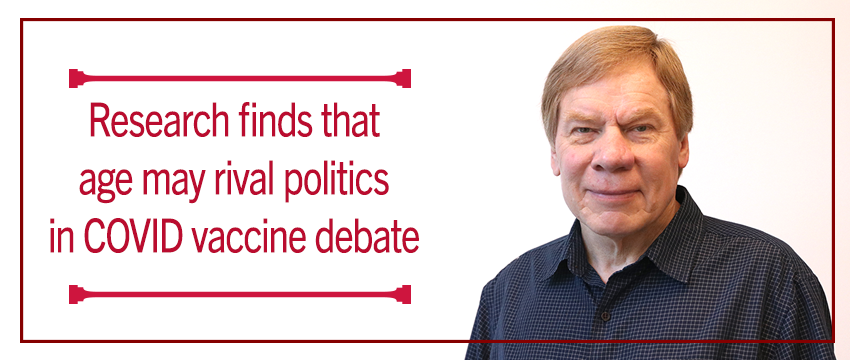Age may rival politics in COVID-19 vaccine debate

Age may rival politics in COVID-19 vaccine debate
New research from the University of Georgia suggests age and risk perception may have as much of an effect on COVID-19 vaccine acceptance as party affiliation.
“There’s been a lot of attention to political ideology as a barrier to COVID-19 vaccination acceptance,” said Glen Nowak, corresponding author of the study and professor in Grady College. “What we found in our survey was that’s not so much true as people get older. Current CDC coverage data affirms this. People who are 65 and older are almost universally vaccinated, particularly as you start getting to 75 and older.”
The nationally representative survey of more than 1,000 people examined how demographic characteristics—such as age and sex, political ideology and news source preference—related to views on COVID-19 and vaccine intent.
Respondents who were age 50 or older considered themselves more at risk for severe illness from the coronavirus. And they were more concerned that catching the virus would negatively impact their daily lives.
Younger Americans were less likely to consider themselves at risk of severe illness. They’re also less likely to worry about contracting the virus and less likely to keep themselves up to date on the latest COVID-related news.
“Looking at 18- to 29-year-olds, it’s not surprising that they are the group with the lowest overall COVID vaccination rates because they’re not a group that is suffering serious illness and death from COVID,” said Nowak, who also serves as co-director of UGA’s Center for Health and Risk Communication. “Are there instances of that? Absolutely. But it’s relatively rare. I think many people in that age group understand that.”
Glen Nowak talks with WSET about COVID-19 vaccination research findings.
More COVID-19 information isn’t always better
Published in the International Journal of Strategic Communication, the study found that political affiliation and where participants got their news were the most consistent predictors of how an individual felt about their COVID-19 risk level and their vaccine intent.
Liberals in the study viewed the virus as a bigger threat to their daily lives than conservatives. They worried about becoming ill, believed symptoms would be severe and expressed concern that they could pass the disease to others. They were also more likely to accept the vaccine and trust authority figures like the CDC and FDA.
Both liberals and moderates believed medical care and treatment would be more difficult to access than conservatives.
Surprisingly, people who said they get their COVID-19 news from a variety of sources, both conservative and liberal, were more likely to be vaccine hesitant than those who stuck to partisan news sources.
“If you had asked us before we this study, we would have said pretty confidently that people who were looking at a wide array of information would be much more likely to be vaccinated and have much more confidence in the vaccine,” Nowak said. “What this suggested was the opposite in many instances. Many people who tried or said that they looked at a broad spectrum of information sources came away less confident and more uncertain about the vaccine and its value.”
Public health should tailor messages to the right audiences
The differences between participants on the right, left or middle highlight the need to tailor COVID-19 messaging to different populations, Nowak said.
Those who aren’t in a high-risk category, like young adults, quickly realize that they’re unlikely to get really sick from the coronavirus and largely tune out public health education efforts.
Communications to these populations should focus on more realistic situations for them, Nowak said. For example, emphasize that there aren’t great treatments available to treat patients if they are one of the few who do need hospitalization.
“This data shows you can’t assume interest and attention from younger people and those who are less affected by COVID-19,” Nowak said. “It’s a good reminder that we can’t just blast, ‘Everybody should be afraid of getting severe COVID.’ That’s not an effective communication strategy.”
This study was co-authored by Michael Cacciatore, an associate professor in the Grady College and co-director of the Center for Health and Risk Communications.
Editor’s Note: This release was originally posted on the UGA News website.